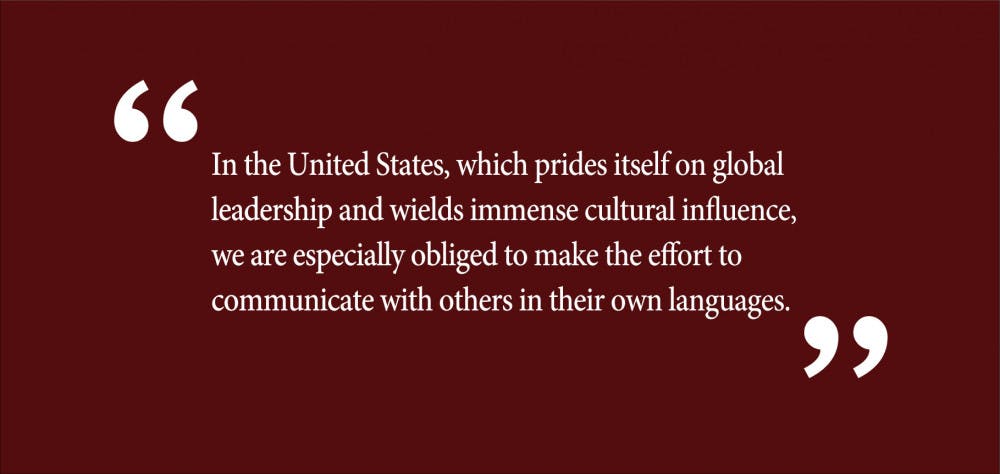A lifelong goal of mine is to become bilingual. Since coming to Brown, and especially since exploring more of the world and spending a semester abroad, I’ve come to see the value of knowing more than one language. In fact, I would argue that everyone should learn a second language. Learning a second language can provide us with a host of professional and personal benefits. But in the United States, which prides itself on global leadership and wields immense cultural influence, we are especially obliged to make the effort to communicate with others in their own languages.
First, learning a foreign language can provide us with particular benefits to our professional lives. Forbes Magazine lays out three specific corporate benefits of learning a foreign language. Those who are bilingual experience fewer barriers to communicating with others, so they are able to create larger personal networks. In some studies, bilingual people have demonstrated stronger decision-making skills and are thus able to draw conclusions more effectively. And finally, bilingual people have been shown to improve their memory, which is invaluable in the workplace.
On a more personal level, learning a foreign language can open up the world to us and allow us to create connections which would otherwise be impossible. As I wrote in my last column, studying abroad last semester was a transformative experience for me. This experience was so powerful for me largely because knowing even a little bit of French allowed me to engage with many different communities in Cameroon. Extending this idea even further, studies have shown that people who decide to learn a foreign language can develop more positive attitudes toward that language, and — perhaps even more significantly — toward the speakers of that language. This is especially important given that non-English speakers are so often marginalized in English-speaking countries. Learning a language can foster cross-cultural connection and understanding — to the benefit of everyone involved.
The United States currently lags far behind other developed countries in teaching foreign languages in public schools. For example, in 2016, 100 percent of Norwegian primary and secondary school students were taught a foreign language in class. That same year, Europe’s median percentage of primary and secondary school students learning a foreign language was an astonishing 92 percent. In the United States, however, only 20 percent of primary and secondary school students were taught a foreign language in class; in most states, less than 25 percent of students took foreign language classes.
To bring this conversation even closer to home, The Herald reported early last year that the University’s student enrollment in modern language courses between 2009 and 2018 decreased by 20 percent. Nationally, 651 university language programs closed from 2013 to 2016. The United States clearly does not prioritize language-learning as other countries do, and the data suggest that we are not likely to give language-learning the priority it deserves anytime soon.
The U.S. deficiency in foreign languages is particularly noteworthy, given its role on the global stage. If the United States is to be the global leader it seeks to be, it comes as a bit of a surprise that a very useful step in taking up this charge — learning another language — is not as emphasized as it could or should be. Global leadership does not entail expecting everyone else to speak English; rather, it entails effectively collaborating across borders for the sake of global prosperity. This scale of collaboration requires proficiency in different languages.
To be fair, the United States is not entirely at fault for lagging behind other countries in teaching foreign languages. European countries have an advantage, for example, because they tend to border neighbors who speak different languages; in that context, picking up another language can be both easier and more immediately applicable.
But we must also remember that the United States is not a solely English-speaking country. In fact, it does not even have an official language. Spanish maintains a significant presence across the country. As of 2015, the United States has the second-highest number of Spanish speakers in the world, behind our neighbor Mexico. In New Mexico, Spanish speakers make up 47 percent of the population, while in California and Texas, they comprise 38 percent. In light of the widespread presence of Spanish speakers in the United States, we have reason to place greater emphasis on teaching and learning the language. This emphasis would allow us to communicate not just with many of our fellow citizens, but also with the 500 million Spanish speakers worldwide, thereby making the country a more effective global leader.
Learning a new language has many benefits. The ability to speak multiple languages can open doors for each of us professionally, but it can also allow us to communicate more effectively with one another in an increasingly globalized world. We — in particular, English-speaking monolingual Americans — would be well-served by learning another language, which would allow us to engage more meaningfully with the world.
Quentin Thomas ’21 can be reached at quentin_thomas@brown.edu. Please send responses to this opinion to letters@browndailyherald.com and op-eds to opinions@browndailyherald.com.



